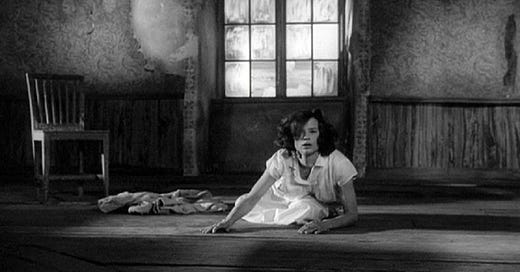Through A Glass Darkly: Who Are We in the Age of Internet?
To "see through a glass darkly" is to have a warped vision of reality. What's yours?
I think I might know something about you. Let’s see if I’m right.
By the mere fact of you reading a publication like Cappuccino, I can reasonably surmise: 1) friends are likely to describe you as “curious,” “intellectually driven,” or “empathetic,” 2) you are probably retired, or if not retired, able to work flexible hours at a reasonably undemanding job, 3) you are either formally educated or managed some approximation thereof by copious amounts of reading, 4) you travel and/or entertain ideas of traveling.
How did I do?
It’s not lost on me that I’m reaching you through a screen. Cappuccino is, after all, an online publication. It depends on screens as a means of distribution. How—or if—I was able to guess correctly, you will have to wait until the end of the article to discover. Before then, I’d like to talk about screens, celebrity, consumer spending, and a quaint, long-ago pastime called reading. Which you actually seem to be doing right now, so good on you.
The first indoor theater in the United States dedicated to showing movies opened in 1896. It was in New Orleans and called Vitascope Hall, named after the projector it used: Edison’s Vitascope. Much like everything else Edison “invented,” it was actually created by somebody else, in this case Charles Francis Jenkins and Thomas Armat. The men soon fell out with one another. Jenkins sold his interest to Armat; Armat sold both his and Jenkins’ interests to Edison.
Within just a few years, rapid improvements in quality of equipment and entertainment made movies wildly popular with the public, especially the American public. Moviegoers sat in beautiful Art Deco theaters and stared at a generation of newly minted film stars whose images appeared on screens twenty-five feet high. Our awestruck reverence was in direct proportion to the size of those screens. Movie stars were literally “bigger than life”—and certainly bigger than us. We sat in a dark room with a bunch of strangers and worshipped the people we watched onscreen. They were gods. They were Other.
The sheer size of early movie theaters, and by extension film screens, was not unlike the massive interiors found in houses of worship. The purpose of a church, say, with its 500-foot vaulted interior, stained glass windows, and religion-for-the illiterate Renaissance paintings had but one purpose: to make the faithful feel the weight of their own insignificance. More importantly, their insignificance compared to the perfection of Almighty God. It is my belief that movie theaters erected during the Golden Age of Hollywood served much the same purpose as church. Without fear of being discovered or shamed, we could stare at a screenful of beautiful people who, much like Jesus on the cross, did not have it within their power to stare back. We turned our eyes away from God and made ourselves not graven images, but celluloid ones.
By the early sixties, blacklisting of “communist” screenwriters, rising production costs, disbursement of the Big 5 movie studios exercising hegemonic control over the industry, and most importantly, the advent of television brought an end to the Golden Age of Hollywood. Movies continued to be made, but the size of theaters started shrinking. In 1963, a man named Stanley H. Durwood in Kansas City, Missouri, opened the first movie theater designed to be a twin multiplex. Now the screens were even smaller, and the whole “church-like” experience of going to the movies was stripped of meaning. The Art Deco palaces of yore were torn down and turned into shopping centers. Film stars lost a bit of their luster, too. No longer were they bigger than life. Now, their images were beamed into most houses in America, albeit smaller, grainier, and sadly diminished.
In 1987, a precursor to today’s internet known as the NSFNET was launched. A decade later came early prototypes for social media: CompuServe, America Online, and Prodigy, which gave rise to bulletin board messaging and online chatrooms. These fell in turn to competitors like Myspace. By 2008, in a whirling vortex of digital innovation, Myspace was eclipsed by Facebook.
In 2010, Instagram became America’s favorite photo and video sharing social network, which made it an important acquisition for Facebook two years later. Now, seventy-two percent of all U.S. adults use social media. We live in an age when opting out of social media is considered a “deviant” lifestyle choice.
Within a dizzyingly short period of time, screens went from laptop-sized to smartphone-sized. Instead of gazing raptly at movie idols on massive screens, we hold them in the palm of our hand. Not only are we bigger and they smaller, they are no longer at a remove. We can follow them on Instagram and Twitter. We can give our opinions about them in public forums. Maybe we aren’t famous, but we’re fame-adjacent.
Celebrities may enjoy a higher status than ourselves, but they are no longer gods. We can touch them. In fact, we can be them. The great democratization of the internet makes potential stars of us all. We’ve become watchers and performers, both. We can see our selfies and vacation videos in the same place that everyone else can: Facebook, Snapchat, TikTok, Instagram. Celebrity is available to us, too—or so we think. The authority of talent, discipline, coming up through the ranks, paying one’s dues—these are the artifacts of previous generations. Now, status is king. And you don’t even have to learn anything, know anything, do anything, or be anything to get it. Cashing in as an Instagram influencer is of far higher status than being an artist who is only known to a handful of weirdos in obscure circles.
But you’ll need followers. And if you can’t get them legitimately, you buy them from click-farms, which are fraudulent organizations that leverage large groups of cheap workers to manually click on whatever you pay them to click on in order to boost your follower count.
But an interesting thing is happening. Time was, television networks were forced to lay out huge expenditures of cash on programming. To keep eyes on screens so they could sell advertising, TV networks had to find a way to entertain the masses, and the best shows tended to be expensive. Now, we provide the entertainment. Us. We’re the ones keeping eyes on screens. Not television screens, of course, but computer and smartphone screens. Moreover, we provide this service for free: twerking, cat-walking, Tide-pod-challenging our way to the top of the algorithmic totem pole.
Advertisers are still raking in billions of dollars every year; they’re just not having to pay for that much production. First, we were the entertained. Now, we’re the entertainers. Life is nothing if not ironic.
We would be wise to remember that the number one driver of the U.S. economy—the strongest and most stable economy in the world—isn’t our exports. It’s consumer spending. Consider the implications of that. The reason we’re on the precipice of a recession right now is because the cost of goods and services has risen and consumer spending has receded. If we don’t shop, the wheel doesn’t spin. And the only way—the only way—people are compelled to shop is if their desires for consumer goods are whetted, frothed, in a state of constant agitation. We do this with advertising. Advertising that is primarily brought to you on a screen.
No other country relies on consumer spending to the same degree that Americans do. Capitalism demands ever-increasing amounts of consumption. Germany’s main economic driver is the export of manufactured goods. Italy’s is goods and services. When we look at how much money the U.S. spends on advertising, we start to get the picture: over 300 billion dollars annually. Only China spends more. With a population of over 1,425,887,337 people compared to the 332,403,650 we have in the United States, our per capita advertising expenditures seem all the more Orwellian.
That consumer rat wheel takes a toll. I believe the low complexity entertainment we see all around us is a direct reflection of what happens when people are subjected to incessant financial demands made by an economy whose primary driver is consumer spending. At the end of a long day spent raising a family and working two or even three jobs to meet expenses, the last thing in the world most Americans want to do is read a book or watch something that makes mental or emotional demands. They want a drink, a bong rip, or an hour or two of “mindless” entertainment.
We are desperate to get back what we lost, to top off the empty tank that is us after a day spent “earning,” and we’ll do it in the most expedient, unhealthy ways possible. We know fast food is poisonous. We eat it anyway. We know we should read a book. Instead, we scroll. And scroll. And scroll.
It’s costing us, this unsustainable consumerist lifestyle and slavish adherence to screens. It’s costing us as individuals and as a country. On some level, we already know it, even if we aren’t able to articulate why we feel this growing sense of unease.
Here, then, are some thoughts.
More than at any other point in human history, we are inundated with images and information. People have given up on trying to make sense of a world that seems increasingly alien and frightening, one we are now connected to 24/7 through screens. Overload leads to confusion; confusion to passivity. That’s when we start relying on figures like Donald Trump to interpret reality for us. Trump’s worldview is simple: liberals bad, “patriots” good.
But there was a certain amount of inevitability to this. Starting with television, screens have conditioned us to accept other people’s authority. Our willingness to trade active, first-hand experiences of a world that now terrifies us for passive second-hand experiences mediated by strong-man authoritarian figures has made a shambles of our lives and our country.
Screens are artificial. The experiences shown you are by their very nature second-hand. Everything you see on them is designed to be monetized. Advertisers are colonizing us through our collective experience of their artificially created environment. The very purpose of advertising is to homogenize people and culture. We are drowning in choices (shampoo, cars, political candidates), but choices aren’t the same thing as freedom. A pity we haven’t figured that out yet.
As a result, we have two lives: our life onscreen, and our life among the living. What’s forfeited is our attention span and our ability to deeply connect with what’s actually in front of us. How can we when we’re addicted to our plug-in drug?
Studies show that reading is a radically different experience than watching screens, which can only show personalities and ideas on a surface level. Books require you as a reader to concentrate on what’s being said. They make you privy to a character’s innermost thoughts in a way that movies can’t (Being John Malkovich is a quirky exception). For that very reason, books foster greater empathy. They increase verbal dexterity. They flex the mental muscles necessary to focus. They slow cognitive decline in older people and offer more and better information than what we find online.
And this leads me back to my earlier suppositions about you.
You’ve read this entire article, which means you are comfortable with high complexity material.
You had the time to read it (ergo, my assumption that you are retired or flexibly employed) and you had the mental bandwidth to do so.
By reading this and other articles, you are betraying the fact that you are curious about the world and differing perspectives, which suggests a high degree of education, whether formal or self-taught.
You are empathetic in the way of all people who are curious and seek other perspectives.
You are also part of a shrinking number of people who possess these skills. Remember that. Maintain your focus. Guard your reading habit with your life. The world needs you and people like you. It may not know that yet, but it will.
Screens aren’t going away. The only thing that will change is their size and the way we interact with them. Personally, I make full use of screens. In my line of work, especially as a writer and digital nomad, screens are unavoidable.
But that doesn’t mean we let them consume us. We can always be mindful of how we’re using them, how much we’re using them, even why we’re using them. Cultivate boredom. Make a game of it—how long can just sit without grabbing your phone? Above all, READ whenever you can. Read for enjoyment, yes, but also to preserve your ability to focus, even if it’s just for ten minutes a day.
As Game of Thrones author George R.R. Martin said, “A reader lives a thousand lives before he dies. The man who never reads lives only one.”
Copyright © 2022 Stacey Eskelin
Have opinions? Chime in! I want to hear them. Be sure to leave your comments below.








Love "choices aren't the same thing as freedom." My mother still reads at 92 and I read every day, on a tablet. Not into paper anymore but reading, yes, I am.
"Now the screens were even smaller, and the whole 'church-like' experience of going to the movies was stripped of meaning." And now the same is true of actual churches, which often look like movie theaters or corporate office buildings. The wonder and awe is gone - all that's left is the ranting of the preachers.
And yes, you know me - you hit 3-1/2 out of 4.